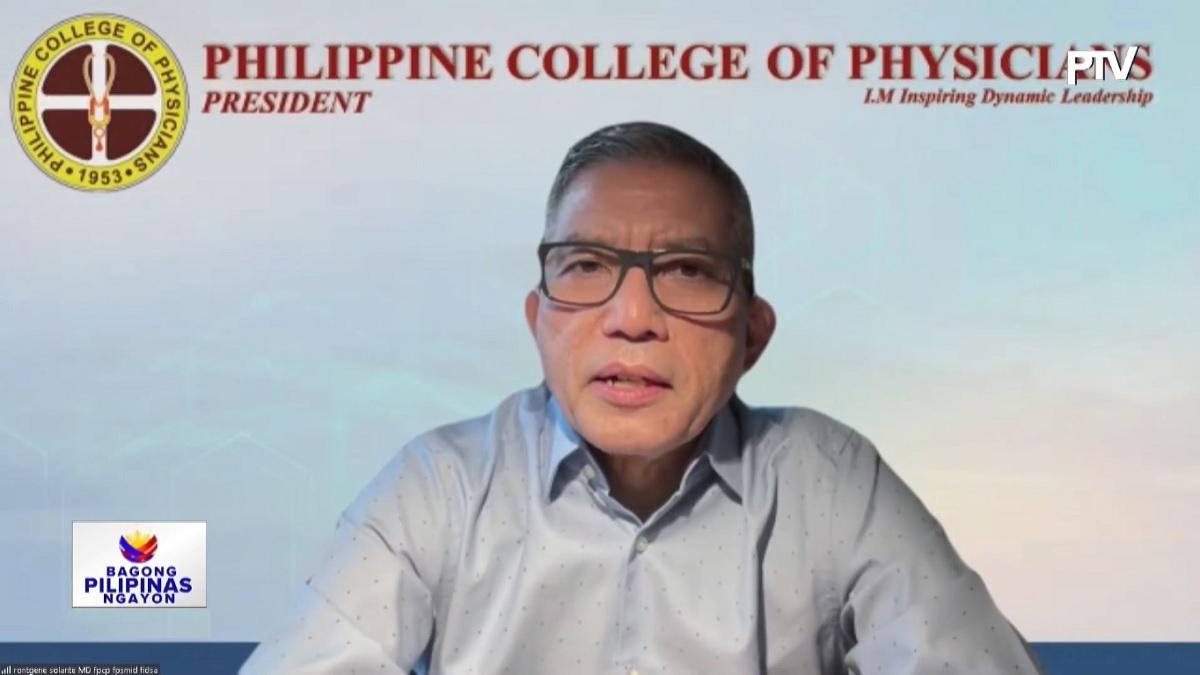FLiRT COVID-19 variants pose low public health risk but stay vigilant, says expert

The new COVID-19 variants KP.2 and KP.3, more commonly known as “FLiRT,” pose “low public health risk,” infectious diseases expert Dr. Rontgene Solante said Thursday, but he also advised the public to remain vigilant and keep themselves protected.
Solante, who also serves as president of the Philippine College of Physicians, said that even normal individuals could also be at risk, as the previous COVID-19 vaccines made available in the country could no longer give much protection against these newer coronavirus strains.
“Nakakalungkot lang dahil because of the mutations, itong mga bagong variants, hindi na tayo protektado doon sa unang mga bakuna natin na nakuha,” Solante said in a Bagong Pilipinas Ngayon interview.
(It's sad because new variants emerge from mutations, and we are no longer protected by the first vaccines we got.)
“Talagang tayong lahat ay vulnerable na at kaya dito natin sasabihin sa publiko na talagang mag-ingat tayo at mag-matyag sa mga sintomas natin dahil pwede tayong mag-severe, especially sa mga matatanda, even if you are vaccinated,” he added.
(We are all vulnerable and so we should really be careful and watch out for our symptoms because we can get severe infections, especially in the elderly, even if they are vaccinated.)
According to the doctor, there are reformulated COVID-19 vaccines made that could help protect against these new variants, but they are not yet available in the Philippines.
Citing data from the World Health Organization (WHO), the Department of Health (DOH) said Tuesday that there are three new COVID-19 variants under monitoring: JN.1.18; KP.2; and KP.3. These are all descendants of the JN.1, which is a variant of interest.
Further assessment, however, is still needed to determine their transmissibility and capacity to evade immune response.
“So far, this has a low public health risk. Ibig sabihin, hindi ito kagaya ng mga Delta before o Alpha na talagang mataas ang risk na ma-hospital at saka pwedeng magka-severe,” Solante said.
(But so far, these variants have a low public health risk. Meaning, they’re not like Delta or Alpha variants that really have a high risk for those infected getting hospitalized or getting severe conditions.)
“Ganunpaman, itong mga new variants na ‘to, kailangan pa rin nating mag-ingat, especially the vulnerable population kagaya ng mga matatanda at mga immunocompromised.”
(Despite this, we still need to be careful, especially the vulnerable population like the elderly and the immunocompromised.)
Solante said that vulnerable individuals who have low immune response, have a tendency of getting severe infection when they get infected with the FLiRT variants.
Thus, they should still wear face masks in crowded areas and consult a healthcare professional whenever they have respiratory symptoms.
The DOH earlier said that all regions in the country remain at low risk for COVID-19, despite a “small” increase in cases recently observed and new variants being monitored internationally.
Even Health Secretary Ted Herbosa on Wednesday said he would not recommend any border control or travel restrictions amid the reported increase of COVID-19 in Singapore.
For Solante, such an uptick is only “temporary” and should therefore not cause an alarm among the public.
“Hindi tayo dapat ma-alarma because this is just an ordinary uptick. Ibig sabihin, hindi ito magtu-tuloy tuloy na talagang lumalago ang infection, hindi kagaya nung 2021 or 2020,” he said.
(We should not be alarmed because this is just an ordinary uptick. That means, it will not continue spreading, unlike in 2021 or 2020.)
“Huwag tayong mag-panic, hindi dapat ma-alarma. Importante ngayon na protektahan natin ang sarili natin kasi hindi lang naman COVID ang sakit na pwedeng magdulot ng respiratory symptoms,” he continued.
(Let's not panic and get alarmed. What’s important now is that we protect ourselves because COVID is not the only disease that can cause respiratory symptoms.) — BM, GMA Integrated News




